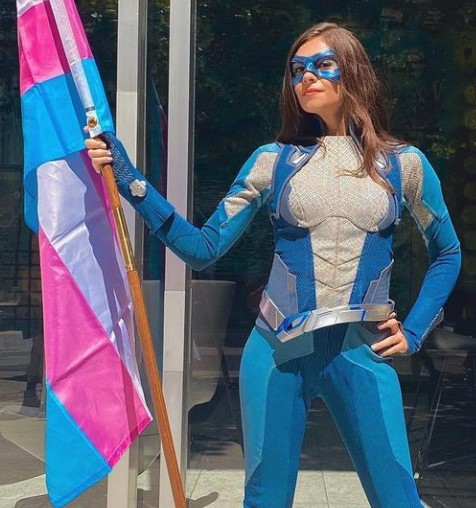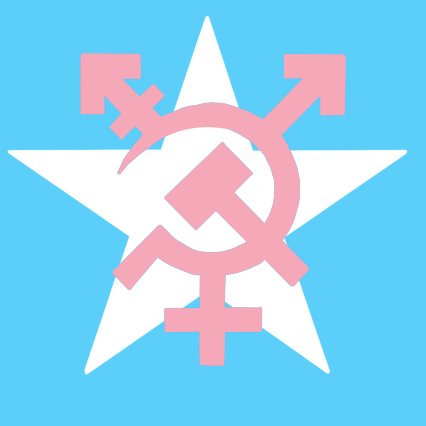Hello comrades!
I think it’s important for our comrades to have a safe place where they can ask questions about trans identities and trans issues in good faith.
The first step in garnering support is education, however asking every single trans person to constantly take on the burden of educator is, frankly, ridiculous, especially when so often the questions are not being asked in good faith, and there are very real consequences to the spread of misinformation.
As such, I know that there are likely comrades here who have questions they have been too scared to ask, or feel like it would be inappropriate to pose to some stranger.
Trans or questioning comrades are also welcome to ask questions here, of course, and are welcome to answer any questions they feel comfortable answering. The thing about the trans experience is that it is different for everyone. We all have different material conditions, we all have different interactions with ourselves and the world around us, and so, of course, there is no universal truth that governs what it means to be trans.
I can’t guarantee that we’ll have an answer for everything, and I can’t guarantee that the answers we do have will be satisfactory, but I can guarantee that as long as you are asking out of a genuine desire to inform yourself and learn more, then I will do my best to engage with you as a comrade and an ally.


hello trans folk, i support you all in your struggle to exist freely and gain access to the healthcare that you need. dysphoria sucks and no one deserves to experience it. since i have at least a basic understanding of trans struggle and healthcare, my question is maybe a little unexpected in this thread:
in my personally-adjacent experiences or stories about much of the western online trans community, i have heard of schisms that unfortunately divide an already-marginalized group of people who should all support each other in their common struggle. for example, passing people with access to hormones/surgery (often of privileged socio-economic status, but not always) who resent those who do not pass for making transness appear less “normal” or more “weird” to basically what amounts to the patriarchy and patriarchal structures. on the opposite side of this schism, there are those who do not have access to trans healthcare and resent those who do pass for a variety of things, perhaps including a perceived or real protection from anti-trans violence. i’ve heard that the interaction between these two groups can approach toxicity/hatred, and can become so intense that it then becomes alienating for anyone on the sidelines. this isn’t exactly a schism, but i’ve also heard that trans people can project their own dysphoria onto other trans people who they don’t see as passing, which can apparently be very toxic and unfortunate because it feels like everyone should just affirm each other
another thing i’ve heard about is a divide between those who want to appeal to cis people by qualifying dysphoria as a mental illness that should be medically treated, and those who claim transness is less material but a vector of personal expression and that calling dysphoria a mental illness is the same basic framework that transphobes often use to justify banning things like puberty blockers (i.e. “transness is the mental illness and not dysphoria”).
coming from both the perspective and experience of those who are trans and have likely interacted with these communities, and who approach things from the perspective of dialectical materialism:
There is, absolutely, friction between “stealth” trans individuals and the easily clockable, largely coming from a place of fear and a desire to assimilate (much like you see with gay culture, where “flamboyant” men are derided by the more “macho” types).
The biggest “schism” as it were is the issue of transmedicalism. Transmedicalists have a very narrow definition of what it means to be trans, and subscribe to a belief that the “trans” story is one of being “trapped in the wrong body” (I’m not discounting this experience, merely asserting that it is not universal) and that there follows a linear path of transition. You get diagnosed with gender dysphoria, you get hormones, you get surgery, and then you live your life as ostensibly cis.
To transmedicalists, those with a different path to transition, especially those who exist outside of the gender binary (think nonbinary, genderqueer, genderfluid, third gender, two spirit, etc) are a threat to the assimilationist agenda. This divide is often leveraged against the queer community, with transmedicalists being (marginally) accepted as the authorities, claiming a “scientific” basis for their viewpoints as the only medically correct definition of trans.
Now, while these divides can be harmful to the trans community, I’d like to say from my personal experience that they exist largely online. That’s not to say people don’t hold these beliefs, and that’s not to say that these divisions aren’t blown up and used in social media to reinforce certain oppressive narratives. However, when it comes down to it, when you actually engage with the community, when you’re in trans spaces or working with trans organizations, you rarely encounter a divide so stark you can’t talk it out or at least work together.
I’ve found then when actually surrounded by other queer people, even those few individuals who are staunchly transmedicalist online have a harder time comfortably voicing or enforcing such beliefs. It’s a stance that really exists as a way to ingratiate yourself with the anti-trans cis community (as if that will ever work) and not one that many people find support for in real life, queer spaces. All it tends to do is alienate you from other queer people, especially considering that more and more the trend is towards people rejecting binary gender roles altogether. Statistically, there is a rise in those identifying as gender diverse that is quickly outpacing those coming out in a more “traditional” trans identity.
This is a result of wider education, and more people being made aware of the classist and colonial nature of the gender binary to begin with.
Very roundabout answer here, sorry about that. But yeah, the schisms are real, they are damaging, but they tend to seem more dire and more ever-present online than they actually are out in the real world. Once you log off, you have to face that the average cis person barely considers trans people at all, the ones who do tend to be fixated and angry about your existence, and life is a hell of a lot easier when you can at least lean on other trans people for the bare minimum of “uses the right pronouns and also gets pissed at transphobia”
I also want to add that my experiences are largely informed by living in poverty and working alongside other impoverished queer people, and working in organizations that provide services in impoverished neighbourhoods. Affluent queer people are more likely to be stealth, or transmedicalist, largely because they have access to the treatments and expensive grooming habits that foster passing (I could really get into how I feel about passing as a concept but that’s another conversation). They also have more to lose by being rejected, and thus feel more pressure to find commonality with heterosexual norms.
On average queer people in fact tend towards poverty (there are a variety of reasons for this) and as such don’t often have such access, which leads to very different understandings of what gender presentation is, and also leads to having radically different priorities. For impoverished queer people, the struggle for food, housing and medical treatment are paramount, and as such there tends to be more acceptance and solidarity with others, and less time and energy to focus on ultimately inconsequential divides.
I also want to throw in, while I’m sort of on the subject, that people often equate working class or impoverished people with prejudice against queer people, and consider queer acceptance to be a bourgeoise value.
In my personal experiences this has been the exact opposite. By nature of our common class struggle for the basic necessities of life, impoverished and working class heterosexuals have been more open and accepting of working alongside and building community with our queer organizations. Meanwhile, the liberal, “progressive” and affluent communities and organizations have been incredibly reticent about accepting us, and are much more likely to employ terf rhetoric.
I also live in one of the poorest parts of my country, which just so happens to be one of the most gender diverse according to the 2020 census. I have strong doubts that this is a coincidence; rather, I believe that there is a link between poverty and a willingness to eschew the ruling class’s gender roles, which were crafted specifically as a means of elevating and securing the class interests of white men. (This is another subject I could talk a lot about)
thanks so much for your long and detailed response! lot of interesting things to mull over. it’s great to hear that to the extent that divides do exist they are less prominent IRL, especially when people have to struggle for their basic material needs.
Well said! I agree with your assessments here. I had tried to write a post about the transmedicalist issue, passing, classism, colonialism, etc. but couldn’t get my thoughts organized. Thank you for expressing it clearly!
So, not sure if I’d really describe it as a schism, but yes, resentful people do indeed exist for a variety of reasons. Personally, I am on the ‘not really passing to well’ side (I get ‘ma’amed’ about… 20% of the time I guess? Nowhere near enough for my liking) and I personally am deeply envious of those who have better access to healthcare than me, either through being more affluent or living in a place with the care, or simply being younger and coming out earlier. It’s a shame (albeit understandable) that some people let that envy they have turn into hatred. I can’t speak for the other side but I have seen people like that - essentially they are re-enacting the same attempts that the gay community went through (and is still undergoing tbh) to be ‘acceptable’ to the straights.
In any case, I wouldn’t say it’s on the level of splits within the left, apart from the ‘should we fit in with the cissies’ thing. Personally, I say no, no marginalized group achieved liberation by being well behaved for their oppressors. But I’m not gonna have a fight with someone who just wants to stealth, so long as they leave me alone to be loudly and obnoxiously trans.
Oh and in my experience, ML trans folks are just as toxic, fractured and annoying as other trans folks, possibly more as many have a tendency to want to be ‘right’ - ideological purity is a helluva drug. schniff
thanks for sharing your experience on passing and pass/not-pass resentment. i totally agree with the sentiment about how to achieve liberation, and the fact that you can’t blame people for just wanting to get by and live their best life. and that’s really surprising about the ML trans community, i wouldn’t have expected that although ofc there’s eventually going to be drama and contradictions within any community.
Yeah it’s sad, but the worst experiences I’ve had with other trans people (in terms of personal interactions) have been with MLs (or at least, claimed MLs). Like I said before, I think that, at least some of the time, it’s a genuine desire to be ‘doing the right thing’ or whatever, that twists into just being an asshole. Affects other “leftist” types and liberals too, but most of the libs aren’t trying to talk politics at you when you’re at a social event :P